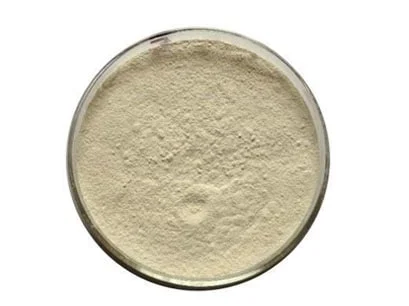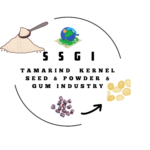Tamarind kernel Gum

Tamarind kernel Gum
Tamarind Gum is obtained from endosperm of the seeds of the tamarind tree (Tamarindus indica linn) and has application in paper, textile industry, food etc. In the food industry it is used as an emulsifier and a stabilizer. Molecules of tamarind gum weigh between the ranges of 250000 and 650000 molar mass. It spreads easily in water and turns to a gluey fluid when heated up, in acidic form and thermal resistant solution. The structure of tamarind gum is suggested to be a main chain of cellulose with many branching at the O-6 positions and short side chains with one or two D-xylopyranosyl capped with D-galactopyranosyl, L-arabinofuranosyl or D-xylopyranosyl units.
Tamarind Gum Powder is prepared from Tamarind kernel powder is obtained from tamarind seeds. Various grades of tamarind seeds are methodically ground to powder at the same time conserving their nutritious properties. These seeds are then roasted and decorticated. Seeds kernels are sorted by color to obtain tamarind kernel powder. The tamarinds seeds are made up of 35% Husk and 65% White Kernel. The white kernel obtained are used to produce tamarind kernel powder.
Specifications
Product |
Tamarind Kernel Gum |
| Color | Creamish White Powder |
| Moisture | 3 – 6% |
| Ash | 1 – 3% |
| Oil Content | 4 – 6% |
| Protein | 10 – 15% |
| Solid Content | 80 – 88% |
| pH | 6 – 7% |
| Mesh size | 100% passing 120 / 200 / 300 mesh |
| Viscosity | 3%- 2500/2900cps in hot boiling water with Brookfield RVT, Spindle-4, RPM 20 |





Packaging Details:
Packing: 200 gm / 500 gm / 15 kg / 20 kg / 50 kg. Bulk orders are also available as per the client’s requirement.
Shelf Life: 24 months after manufacturing.
Storage: In a covered finished good shed, in a dry atmosphere.
Applications:
- Food industry – As adhesives
- Textile industry – As a textile thickener and sizing agent
- Dye Industry – For sizing
- Paper, Printing Industry – As printing paste and as paper glue
- Explosives Industry – As a thickening agent
- Agriculture – For creating fertilizers
- Wood Industry – Woodworks and of plywood manufacturing
- Cosmetic Industry- As an antioxidants
- Oil and Gas Industry – Drilling & Stabilizing soil
- Tobacco Industry – As adhesives
- Paint Industry- For thickening purpose
